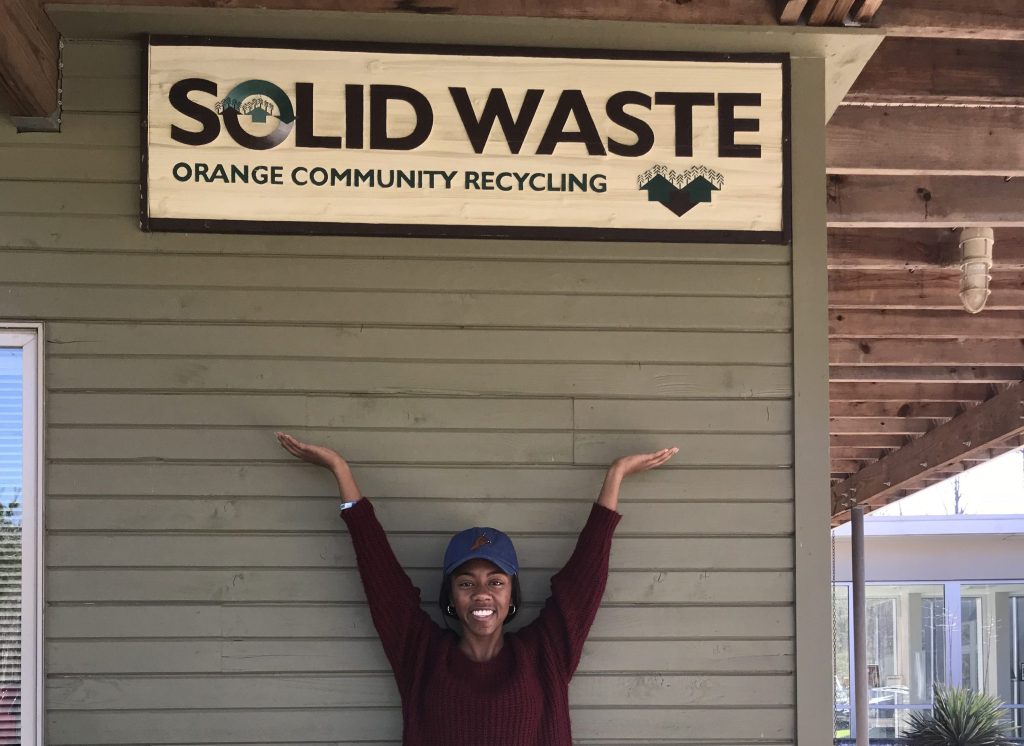Postcard from the Field: STFS – Brianna Small ’19
May 4, 2018
What is your name: Brianna Small
Major: Dramatic Art and Environmental Studies (Sustainability Track) double major with minor in Hispanic Studies
Expected graduation date: May 2019
Why did you want to go to the STFS?
I was interested in the Sustainable Triangle Field Site because I believed that the field site had a wide range of classes that would further develop my understanding of sustainability and how I can do my part to enrich our environment. All of the classes sounded engaging. However, there were a few that I find especially interesting – the Internship, Sustainable Transportation, and Green Architecture and Design. An internship is a great way for me to gain first-hand experience and get a better feel for what I would like to do in the field of sustainability in the future. As for the other two classes, I did not have much much background in either subject and so I have found that I’ve learned a lot from them. In my transportation class, we have had several guest speakers from around the Triangle and even in other parts of the world talk about how they integrate sustainability into transportation where they live and work. The Green Architecture and Design class has given me the opportunity to work with different programs such as Sketchup to build 3-D models. This skill is something that I’ve done before, but found that I really enjoyed it.
What specifically are you doing in STFS?
I am one of twelve students in the cohort this semester. We have an assigned set of classes that we all take, these classes include topics such as sustainable transportation, sustainable cities, a capstone course, internship, a sustainability seminar, and a class about green architecture and design. The capstone course and seminar are only taken by the students in the cohort, the internship is completed with a mentor with an organization that we chose prior to the semester starting and the other classes include other students. All of our classes are Tuesday/Thursday classes except the architecture class is on Wednesday nights. This is so we are able to schedule 9 hours at our internship sites every week to work on projects with our mentors. Within my internship, I’ve been working for Orange County Solid Waste Management as their recycling intern. The two projects I was given were about the recycling practices of hotels and motels in Orange County and the other is about valet waste service at multi-unit housing complexes.
What has been the most impactful experience you’ve had while in STFS?
I’ve really enjoyed getting to know the other people in my cohort. It’s been nice to be able to bounce ideas off of each other for the different projects that we’ve had over the course of the semester. Everyone has a unique perspective to bring to the table and I learn something new from them every day.
What is the biggest lesson you’ve taken away from your experience in STFS?
One of the biggest lessons that I’ve learned has come from my internship. I learned that some people have no idea what company/companies their solid waste goes to or what kinds of things can and can’t be recycled. Going around to different hotels and motels and asking to speak with the person in charge of their recycling/solid waste has been an eye-opening experience. At some places they know exactly who to go to but others they only have a vague guess. One hotel told me to speak with the person in charge of the restaurant attached to them because he handles their recycling, but when I spoke with him, he had no idea who he contracted with and said that the hotel actually handled the recycling. It seems that recycling is more of a passive act and that some people carry out with no intention or care for what is being put in the carts. Another day, I was helping Blair with a separate project and people had recycled #1 containers which are non-recyclable as well as leaving gunks of food in recyclable containers which in turn makes them non-recyclable. I’ve learned that for recycling and solid waste to be most effective, it really needs to be a more active and conscious action where people are looking at what they are putting in the carts and not just putting them there because they see the container is paper or plastic.
Do you have any advice for other students who are considering going to the STFS?
Apply! Apply! Apply! I’m really glad that I applied to the program and was accepted. Also, go to the information sessions that are offered and ask questions or find someone who did the field site before and ask them questions. I had a friend who had done the STFS last year, so I took the opportunity to ask her questions about it and it helped to have some background knowledge before applying.
